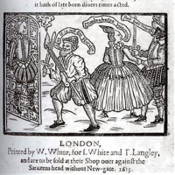
Thomas Kyd
Playwright
Biography
Thomas Kyd
While popular during his lifetime, the Early Modern playwright Thomas Kyd remains largely a mystery to today's audience. Even his birth date and early life are unknown. However, he was one of the most significant playwrights of Renaissance England.
Although he most likely never studied at a university, Kyd is one of the "University Wits," a group of 16th-century poets and playwrights who used their education in the classics to create new forms of drama. Notably, Kyd is credited with writing the first Renaissance-era revenge play, The Spanish Tragedy (a credit he seems to have never taken in his lifetime). Additionally, Kyd is often believed to be the author of the Ur-Hamlet, a play about the Danish prince written prior to (and likely inspiring) Shakespeare's famous play.
Towards the later part of his life, Kyd was in the service of a mysterious noble. Fellow playwright and University Wit Christopher Marlowe joined him in lodgings and service for this unknown patron. Kyd continued to write plays, but also most likely served as a scribe or secretary.
In 1593, Kyd was arrested for libel, and while evidence of such a crime was not discovered, authorities charged him with heresy, and after most likely being tortured, Kyd accused Marlowe of owning heretical documents. (Before Marlowe could be formerly arrested, he was killed in a pub.)
The following year, at only 35 years old, Thomas Kyd died in poverty. He was buried in St. Mary Colechurch in London; however, the church was destroyed in the Great Fire of London in 1666, and Kyd's grave was lost to history.
Known For
Shows
Shows associated with Thomas Kyd
Monologues
Monologues from shows associated with Thomas Kyd
Scenes
Scenes from shows associated with Thomas Kyd
Quizzes
Quizzes associated with Thomas Kyd
Learning Modules
Learning modules associated with Thomas Kyd
Additional Information
N/A